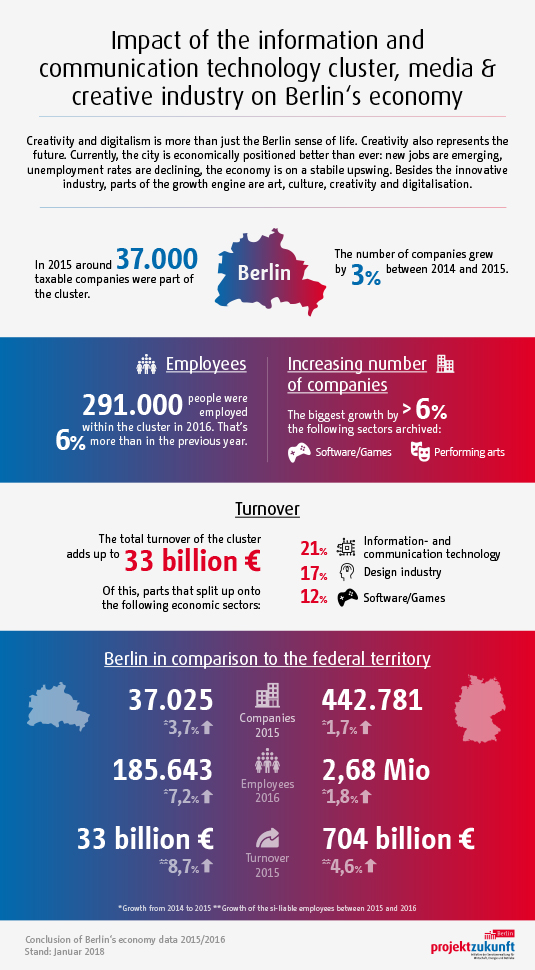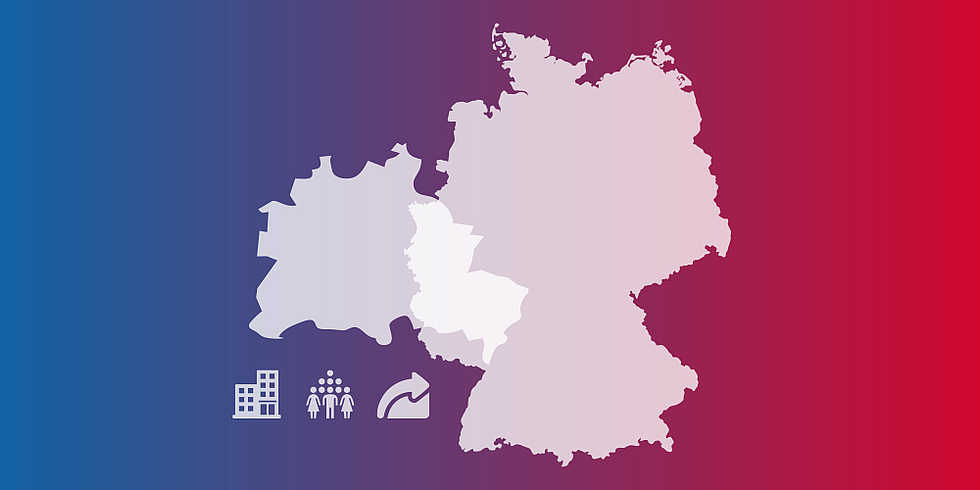Berlin – The Capital of the Digital and Creative Scenes
Unemployment is falling; the increase in working population is highest in Berlin, and in terms of economic growth, Berlin counts among the leading locations for the digital and creative economy in Germany. Compared to the analysis of economic data for the years 2014/2015, Berlin continued the upward trend with regard to corporate, employment and sales figures.
The numbers for the ICT, media and creative economy cluster presented by the Senate Department for Economics, Energy and Public Enterprises for 2015/2016 are a proof of the continued success of Berlin-based entrepreneurs. In 2015, there were about 37,000 companies in Berlin working in the sector of ICT, media and creative businesses, generating a turnover of about 33 billion Euro. The largest sales revenue contributors of the cluster are information and communication technology (turnover of 7.1 billion Euro), design industry (turnover of 5.8 billion Euro) and software/games (turnover of 4 billion Euro).
Between 2014 and 2015, the number of companies working in the field of ICT, media and creative economy has increased by 3.7 per cent. The two sectors of software/games and the performing arts were the industries with the strongest contribution to the increase in the number of companies (software/games: 7% ; performing arts: 6% increase). The growth of new start-ups from 2015 to 2016 was accompanied by a rise in employment of 7 per cent to 185,600 employees. Besides the software/games (13.7 per cent) and the architecture market (10 per cent), the advertising market (9 per cent) has grown considerably.
Berlin compared to the rest of Germany
Berlin counts among the leading locations for the digital and creative economy in Germany. About 8 per cent of German ICT, media & creative businesses are based in Berlin. One major focus lies on the film industry with a share of nearly 20 per cent, while the share of the performing arts industry is 19 per cent, followed by the broadcasting industry with a share of 16 per cent.
About 5 per cent of the nationwide sales volume is generated in Berlin. The sales share in the music industry (21 per cent), the performing arts sector and film industry (with 14 per cent each) are far above-average.
Annual Results for 2017 supplied by Berlin Partner for Economics andTechnology
The continuing upswing that is seen in the Berlin economy is further supported by the annual results for economics and technology supplied by Berlin Partner for 2017. Furthermore, the digital industry provides for the highest growth in jobs. 2,976 jobs will be created in the projects supported by Berlin Partner in the ICT, media and creative sectors. This is about one third of all jobs. Additionally, many jobs are created in the fields interfacing with the digital economy, such as the transport and services sector.
According to forecasts by IBB’s economists, the additional investment and employment effects initiated by Berlin Partner and the acquired third-party funds amounting to 118.2 million Euro will certainly have a medium-term effect on the overall performance of the Berlin economy. Thus, the gross domestic product is expected to increase by 1.5 billion Euro between 2017 and 2019.
“We look back on a very successful and economically strong year 2017. The capital’s economy is continuing to develop dynamically and acts as a significant job creator. Berlin Partner has successfully implemented its task in 2017 as a company devoted to the promotion of business and technology. The investment volume was again very high, and never before were more jobs created through settlement and expansion projects initiated by Berlin Partner than in 2017”, states Christian Rickerts, State Secretary at the Berlin Senate Department for Economics, Energy and Public Enterprises.
How is the creative industry developing in Berlin?
If one is solely interested in the economic data for the creative industry, then the third <link file:11500>creative industry report 2014</link> issued by the Senate Department for Economics, Energy and Public Enterprises in consultation with the Senate Chancellery – cultural department of the Senate Department for Urban Development and Environment provides comprehensive information. The report contains a wealth of detailed investigations into each sub-sector of the creative industry and special topics such as spaces, income trends, cross innovations, culture, and tourism.
Particularly in Berlin, the creative industries play a very important economic role, generating growth and jobs. The Berlin creative industry’s economic data have performed exceptionally well in recent years, also at the national level.
Here are the figures on the creative industry in Berlin at a glance:
- 10 per cent of the sales revenues in Berlin’s economy were generated by the creative industry
- Sales revenues generated by Berlin’s creative economy have increased by 56 per cent (+7.3 billion Euro) since 2009
- Rising incomes, in particular in the design, advertising and software/games sectors
- One in six companies in Berlin is a company working in the creative industry
- The creative industry with its 222,000 employees is a labour market factor
- About 67,000 new jobs have been created in the creative economy since 2009
- Creative industries remain at the focus of political debates
Both the creative and digital economy ensure that the German capital region is a leading location for the digital economy, media and creative professionals. Berlin is an ideal base for the development and sales of new content and mobile applications in future-oriented sectors.



